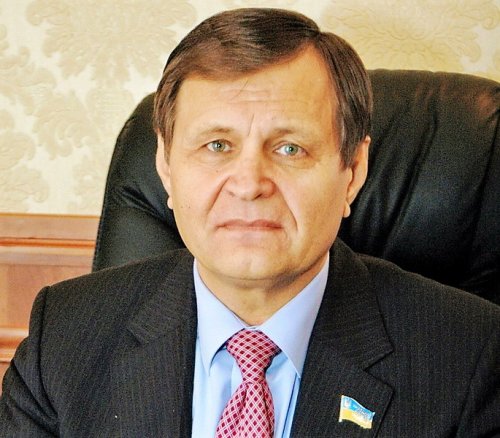Vladimir Landik: why did the brother of the founder of the Party of Regions paint himself “patriots”? PART 1
How did it happen that the former first regional leader of the Luhansk region is today pouring out streams of revelations about his party comrades, persistently drowning them in compromising evidence of corruption and anti-state activities? The long-term history of this enmity, as well as some other piquant details from the past of Vladimir Landik and the present of his relatives, raise great doubts about the sincerity of his honesty and supposedly patriotic impulses.
Vladimir Landik. Overseer businessman
Landik Vladimir Ivanovich was born on December 27, 1949 in the village of Chasiv Yar, Artemovsky district (now Bakhmutsky) of the Donetsk region, in the family of Ivan Petrovich and Alexandra Vladimirovna Landykov. He is three years younger than his brother Valentin Landyk (born November 26, 1946), known throughout Ukraine as the creator and owner of the Nord company, which he sold in 2016. Some of the difference in their surnames is explained by the illiteracy of passport officers: when Vladimir Landik received his first document, his surname was incorrectly translated from Ukrainian to Russian. This is how Landik appeared in the Landyk family.
Following his older brother, who studied at the Kramatorsk Industrial Institute to become a metallurgist, Vladimir Landik followed the same path, entering the Dnepropetrovsk Metallurgical Institute to major in foundry, where he studied in 1967-72. But when the time came for him to serve a year in the army, as a lieutenant, he found himself in the ranks of the Ministry of Internal Affairs. More precisely, in the Department of Execution of Punishment of the Ministry of Internal Affairs, which was in charge of all correctional institutions, as well as control over the work of the so-called. “chemists” – prisoners who worked at industrial enterprises. According to unconfirmed information from sources Skelet.Infothen Landik was immediately assigned to the foundry of the Debaltseve Metallurgical Engineering Plant, with which he would later be associated for many more years. After completing his one-year service, Vladimir Landik remained to work in the same place and in the same position under a contract.
This is how he became a “guardian,” as he was later nicknamed in the 90s, and this explained Viktor Yanukovych’s hostile attitude towards him. However, this nickname is incorrect: Vladimir Landik was never involved in guarding prisoners, much less stood on the tower himself. His work was more interesting and profitable: organizing prison production. And there he worked for 22 years (until 1994), retiring (based on length of service) with the rank of lieutenant colonel of the internal service. So Landik was more likely an overseer of slave labor, or even a slave owner who made a profit from it.
Later, Vladimir Ivanovich, in his interviews with the media, gave very confusing information about the first half of his life, and several times let slip that he had been doing business since 1974 – they say, first selling vegetables and fruits at the market that he grew with his own hands during off-duty hours. Then he said that his mother-in-law allegedly gave him money for his first cooperative in 1986. Well, additional sources of information allow us to put together a mosaic of the real picture. While his older brother Valentin Landyk was making a leadership career in factories in the Donetsk region, Vladimir Landyk turned his service in the Penitentiary Department of the Ministry of Internal Affairs of the Lugansk Region into a profitable shadow business. As a matter of fact, everyone made money from “prisoners” back then: the leadership of colonies, the management of enterprises, “guild workers”, corrupt officials, directors of bases and stores. There were three main schemes at work: the production of additional unaccounted volumes of products, the production of completely “leftist” products, and underpayment to prisoners for their labor.
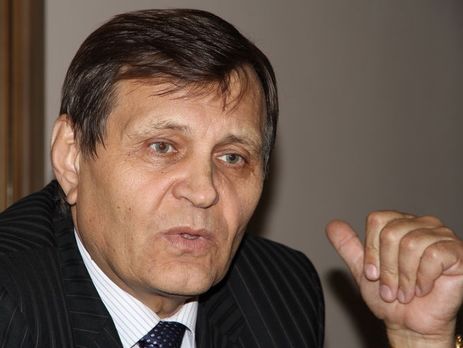
Vladimir Landik
For example, in the colonies themselves, workshops or greenhouses were organized, the products of which were then sold through collective farm markets and department stores. At the same time, prisoners were paid pennies or even exploited for the promise of parole and various concessions. And at state-owned enterprises there were often cases when a team of “chemists” worked both for themselves and for a certain number of dead souls, whose salaries were then divided between the management of the colony and the plant. Perhaps at the Debaltsevo Machine Plant, which Landik supervised until the 80s, such a scheme also worked – or maybe some other one.
There was huge money circulating there: in the Lugansk region, prisoners produced products (only officially) worth hundreds of millions of rubles annually, and one can only guess how much money ended up in the pockets of those who used their labor for their own selfish purposes. Landik had so much “extra income” that they had to be somehow disguised from the OBKhSS and the prosecutor’s office. According to information from his friends, Landik came up with the idea of putting part of his “left” income into his mother-in-law’s savings book – supposedly as her proceeds from selling vegetables and fruits from her personal plot. This made it possible to buy a car with his mother-in-law’s money (the second one, the first one was “gifted” to him by his parents), build a new house, etc. As a matter of fact, it wasn’t even his idea; he took it from the comedy film “Beware of the Car.”
Vladimir Landik stopped “hiding and adapting” in 1986, when “perestroika” began and the era of cooperatives began. It was he who opened, in his words, the first cooperative in the Lugansk region – the money for which he again “borrowed from his mother-in-law.” But this was the last time, since now Landik could no longer hide his capital from the OBKhSS, but register his shadow income as profit from cooperation activities. However, in some schemes it was so: the cooperatives of Landik and his business partners used the labor of prisoners, whose products were then sold. It is not surprising that he did not quit his job at the Department of Corrections until 1994, when, due to the crisis, “prisoners” lost their jobs at enterprises, and thousands of unemployed people appeared in the wild, ready to work literally for food.
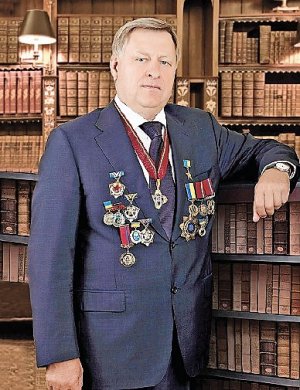
Valentin Landyk
“Nord” and the Party of Regions
In the early 90s, the brothers established themselves in big business in different ways. Valentin Landyk, on the basis of the cooperatives created at his plant, created JSC “Nord”, which first sold gas stoves (assembled at a state-owned enterprise) under this brand, and then took over the production of Donbass refrigerators – which also changed their name to “Nord”. These refrigerators were unimportant even by Soviet standards, noticeably inferior to the same “Minsk”, and could not bring Landyk Sr. hard currency. But he bartered them for fuel and metals, which he then pushed abroad.
Vladimir Landik, having a large amount of money on hand, invested it in “little things” – actively privatizing cafes and canteens, shops, hairdressers, workshops, and small enterprises in Lugansk and the region. Then he sold most of these assets to new owners, already for foreign currency, and focused on larger objects: Central Market of Lugansk (33% of shares), Lugansk Bazaar (33%), Detsky Mir, Rossiya department store, Starobelsky Mechanical Plant , 21st brick factory, Lugansk crankshaft plant, several hotels.
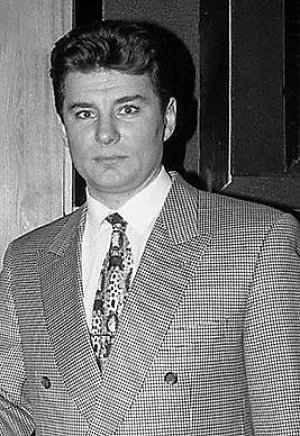
Valery Dobroslavsky
It is curious that in the 90s the brothers had practically no problems with racketeering: here they were helped by Vladimir Ivanovich’s old acquaintances both among the “authorities” of the criminal world and in the Ministry of Internal Affairs. And although Landik was called a good friend of the Lugansk authority Valery Dobroslavsky (nickname Dobroslav), who was killed in 1997, he was not caught up in the subsequent criminal war. But Vladimir Landik had to fight for a long time with the Lugansk mayor Anatoly Yagoferov, who took this post in 1998, replacing his Dobroslav protégé Alexei Danilov. A conflict broke out between them over the division of property.
For example, 33% of the “Lugansk Bazaar” belonged to the city council, and for control of this share (and the seal of the city executive committee) Vladimir Landik (through the secretary of the city council Pristyuk) and businessmen who supported Mayor Yagoferov Oleg Breus and Vladislav Krivobokov – who already owned the other 33% of the “Lugansk Bazaar” – fought ” They couldn’t divide the crankshaft plant among themselves (Landik held the controlling stake, Breus had 33%). Their conflict was known throughout Lugansk, so when in 1999 there was an attempt on Krivobokov’s life (he received 10 bullet wounds and miraculously survived), and in 2001 Breus was killed, they immediately began to blame Vladimir Landik for this. They also remembered the murder in 1997 of businessman Burlachenko, who owned a 15% stake in the crankshaft plant.
The accusation, of course, is unofficial, since the police and prosecutor’s office of Lugansk traditionally have not found either killers or customers. And Landik was called the most likely customer from the pages of the local newspaper “XXI Century”, which at one time went to the people of Breus and Krivobokov after the murder of Dobroslavsky. In turn, Landik bought himself the newspaper “Evening Lugansk” and from its pages counterattacked his opponents with similar revelations. The protracted war initiated by this between the two newspapers then lasted for many years. Moreover, curiously, a distinctive feature of the editorial policy of Vecherniy Lugansk at that time was the exposure of “Jewish-Masonic conspiracies,” which teetered on the brink of anti-Semitism. It is no coincidence that the dismissal of its editor-in-chief Alexey Blyuminov in 2007 evoked the warm approval of many Jewish organizations in Ukraine. At the same time, if in 2014 “Vecherniy Lugansk” took a clearly negative position towards the separatists (and was closed), then “XXI Century”, on the contrary, became the main printed mouthpiece of the “LPR”.
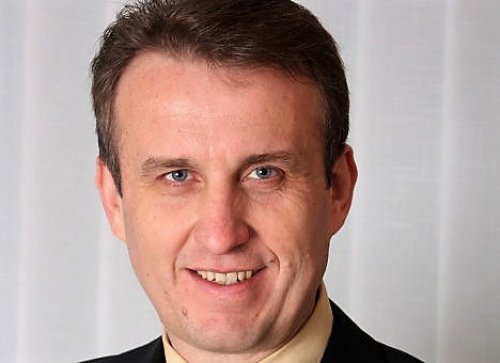
Vladislav Krivobokov
Although the brothers’ businesses overlapped little, Vladimir Landik was listed in leadership positions in the then flourishing Nord empire. In 1994-1996 and 1999-2005. he occupied the place of director of the Luhansk LLC Nord-Service: under this guise the company was engaged not in sales and repair of household appliances, but also in various commercial activities. In 1996-1999, he was vice-president of Donetsk OJSC Nord, while his brother Valentin Landyk sat in the Verkhovna Rada – perhaps this is the only time when Vladimir Landyk was directly involved in his brother’s business. But thanks to his brother, he became the first regional of the Lugansk region.
Sergey Varis, for Skelet.Info
CONTINUED: Vladimir Landik: why did the brother of the founder of the Party of Regions repaint himself as “patriots”? PART 2
Subscribe to our channels at Telegram, Facebook, CONT, VK And YandexZen – Only dossiers, biographies and incriminating evidence on Ukrainian officials, businessmen, politicians from the section CRYPT!

